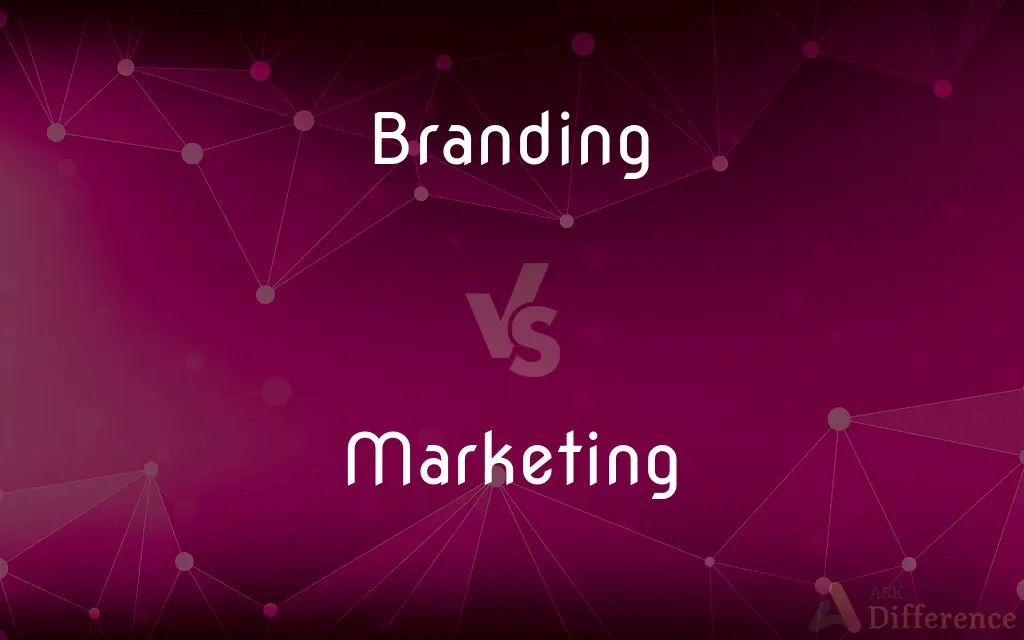Branding vs. Marketing — What's the Difference?
By Tayyaba Rehman & Fiza Rafique — Published on February 29, 2024
Branding is about shaping a company's identity and values, while marketing focuses on strategies to promote and sell products or services.

Difference Between Branding and Marketing
Table of Contents
ADVERTISEMENT
Key Differences
Branding is the process of creating a unique identity and image for a product or company in the consumer's mind, primarily through consistent thematic elements and messaging. It's about conveying who you are, what you stand for, and what unique value you provide. Marketing, on the other hand, involves a broader range of activities aimed at driving sales and engaging customers, including advertising, promotion, pricing, and distribution strategies.
Branding is about establishing and reinforcing who a company is and what it stands for, whereas marketing focuses on tactics and channels to communicate with target audiences to encourage sales. Effective branding creates loyalty and affinity, laying a foundation that marketing efforts can build upon. Marketing strategies might change to adapt to market conditions or consumer trends, but branding remains consistent to maintain identity and values.
Branding and marketing, although distinct, are deeply interconnected. Branding influences the style and direction of marketing campaigns, while marketing techniques can help to build and enhance a brand's visibility and reputation. The synergy between branding and marketing is crucial for a cohesive perception by the consumers, influencing their decision-making process.
In the digital age, branding often involves a strong online presence, including a memorable logo, a cohesive color scheme, and a consistent voice across all platforms. Marketing, in this context, leverages digital channels like social media, email campaigns, and SEO to reach and engage potential customers, always ensuring the brand's core message and values are at the forefront of any communication.
Comparison Chart
Focus
Identity and values
Promotion and sales
ADVERTISEMENT
Goal
Establish loyalty and recognition
Drive consumer actions
Consistency
Remains constant
Can vary based on strategy
Tools
Logo, tagline, brand voice
Advertising, social media, SEO
Impact
Long-term consumer relationship
Immediate engagement and conversion
Compare with Definitions
Branding
Crafting a unique name and image.
Apple's branding revolves around innovation and simplicity.
Marketing
Promoting products or services.
McDonald's uses Happy Meals to market to children.
Branding
Establishing a significant presence.
Nike's Just Do It slogan embodies motivation and action.
Marketing
Engaging with target audiences.
Spotify's playlists cater to diverse musical tastes to engage users.
Branding
Building customer loyalty.
Starbucks creates a sense of community around coffee.
Marketing
Utilizing various channels.
Amazon employs targeted email campaigns to promote deals.
Branding
Evoking emotional responses.
Coca-Cola's branding evokes feelings of happiness and togetherness.
Marketing
Implementing strategic campaigns.
Old Spice rejuvenated its brand with humorous marketing campaigns.
Branding
Differentiating from competitors.
Tesla's branding emphasizes sustainability and cutting-edge technology.
Marketing
Analyzing market trends.
Netflix uses viewer data to market relevant content to users.
Branding
To consider or label as disgraceful or infamous; stigmatize
Branded the deserters as cowards.
Marketing
The activities required by a producer to sell his products, including advertising, storing, taking orders, and distribution to vendors or individuals.
Branding
A trademark or distinctive name identifying a product, service, or organization.
Marketing
The strategic functions involved in identifying and appealing to particular groups of consumers, often including activities such as advertising, branding, pricing, and sales.
Branding
The promotion of a commercial brand of product in order to give it greater public awareness.
Marketing
(uncountable) The promotion, distribution and selling of a product or service; the work of a marketer; includes market research and advertising.
A bachelor's degree in marketing
Marketing
The commercial processes involved in promoting and selling and distributing a product or service;
Most companies have a manager in charge of marketing
Common Curiosities
What is the main goal of branding?
To create a distinctive identity and foster loyalty.
Can a company survive without branding?
While possible, a lack of branding often leads to a lack of differentiation in the market.
Why is marketing important for businesses?
It drives sales and helps in engaging with potential customers.
Can good branding compensate for poor marketing?
Strong branding can help, but without effective marketing, potential sales may be lost.
What's the role of a logo in branding?
It's a visual symbol of the brand's identity and values.
How does culture influence branding and marketing?
It shapes the messaging and values communicated to ensure relevance and resonance.
How do startups approach branding and marketing?
They often focus on innovative branding to stand out and use agile marketing to grow.
What's the impact of branding on consumer choice?
Strong branding can lead to a preference for that brand over competitors.
How does marketing differ from branding?
Marketing focuses on promoting and selling, while branding is about establishing identity.
How does social media influence marketing and branding?
It offers platforms for both to engage directly with the audience, enhancing visibility and loyalty.
How often should branding change?
Branding should remain consistent, though minor updates can keep it fresh.
Can branding and marketing work in isolation?
While they can function independently, their effectiveness is significantly enhanced when integrated.
How do marketing strategies evolve?
They adapt to market trends, consumer behavior, and technological advancements.
Is digital marketing replacing traditional marketing?
Not replacing, but digital marketing is becoming more dominant due to its reach and efficiency.
Is customer feedback important for branding and marketing?
Yes, it provides insights for improvement and adaptation.
Share Your Discovery

Previous Comparison
Programmed Decisions vs. Non-Programmed Decisions
Next Comparison
Coyote Tracks vs. Wolf TracksAuthor Spotlight
Written by
Tayyaba RehmanTayyaba Rehman is a distinguished writer, currently serving as a primary contributor to askdifference.com. As a researcher in semantics and etymology, Tayyaba's passion for the complexity of languages and their distinctions has found a perfect home on the platform. Tayyaba delves into the intricacies of language, distinguishing between commonly confused words and phrases, thereby providing clarity for readers worldwide.
Co-written by
Fiza RafiqueFiza Rafique is a skilled content writer at AskDifference.com, where she meticulously refines and enhances written pieces. Drawing from her vast editorial expertise, Fiza ensures clarity, accuracy, and precision in every article. Passionate about language, she continually seeks to elevate the quality of content for readers worldwide.
















































